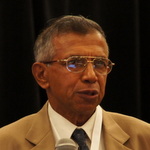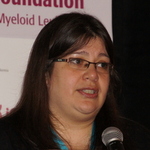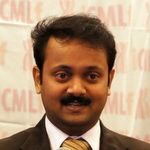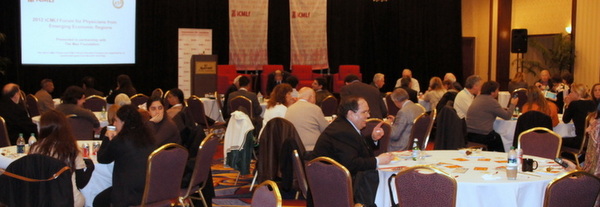iCMLf Forum for Physicians from Emerging Regions: Overcoming Challenges treating CML when resources are limited
Focused on solutions with practical expert discussion
Over 100 physicians attended the 2012 annual 'iCMLf Forum for Physicians from Emerging Economic Regions'. Held during the annual American Society of Hematology meeting (ASH) and in partnership with the Max Foundation (MAX), this iCMLf Forum is an ideal opportunity for physicians from these regions to meet and discus the challenges they face treating CML in a resource limited setting.
The 2012 iCMLf Forum specifically focused on three examples of solutions implemented to address these challenges and projects were presented from India, Paraguay and Sri Lanka. After each presentation there was intensive discussion with the iCMLf experts, questions asked and much learning, all specifically related to the practicality of treating CML with limitations in diagnostics, treatment and patient follow up.
Feedback:
"Fantastic program"
"A really useful meeting for physicians from emerging economies"
"More expert opinion next year"
Focusing the iCMLf Forum on a solution based discussion has been an excellent step forward. The feedback from attendees has been exceedingly positive and we will repeat this same format in 2013. In April the iCMLf will invite submissions of projects to be presented and discussed at the 2013 Forum to be held in New Orleans during ASH.
Thank you to all those who participated in the 2012 iCMLf Forum and we welcome further comments and discussion.
 1) Dr Wattegama, Sri Lanka - Essential actions to improve CML management
1) Dr Wattegama, Sri Lanka - Essential actions to improve CML management
Aim of the project
To explore minimum essential actions by a regional cancer centre in a country with limited resources to improve care, quality of life and possibly survival, of CML patients.
"Clinic attendance increased threefold in one year and double the number of patients were able to access imatinib"
Key actions
- Raise finances through partnership with a charity. Introduce 'Foster Parents' to assist with accommodation, testing and incidental expenses
- Outsourcing the laboratory service led to fast and reliable results and more patients on treatment
- Streamline the CML clinic using CML counselling services and trained CML educators on clinic days
"Sustainability of the project relies on financial stability, credibility and commitment"
Questions for the experts:
- What to do in the case of resistance when 2nd line TKI therapy is not available?
- J Goldman - if neither dasatinib or nilotinib is available then the choice is either allogeneic stem cell transplant, interferon, or hydroxyurea
- T Hughes - dose increase in imatinib is also an option. With interferon patients report decreased QOL, but CCR can be achieved
- M Baccarani - depends on the level of resistance. Even patients not achieving CCR with either partial or minor CR can enjoy long life and good QOL
- C Schiffer - resistance is common so it is important to decrease the frequency of resistance by ensuring compliance
- Reinforce that compliance means not missing doses and not taking half a dose
- Question of when to stop therapy?
- J Goldman - best recommendation is to stay on TKI therapy and not to stop therapy outside of a clinical study
 2) Dr Ayala, Paraguay - Implementation of molecular studies, free for patients
2) Dr Ayala, Paraguay - Implementation of molecular studies, free for patients
Aim of the project
To implement molecular biology techniques to allow the diagnosis and follow up of myeloid chronic leukemia patients through the standardization of the BCR-ABL1 detection and measurement of the transcript levels in Paraguayan patients.
"Even when you think there are no resources they are there. You just need to find them"
Key actions:
- Financial - Begin as a research project with research grants, build on this with grants and scholarships from government, universities and pharma
- Human resources - Engage young motivated researchers who have defined time periods to complete research projects
- Partnerships - Internal, other departments may have resources to borrow. External for training
- Patient recruitment - Develop a referral system from other local centres
"Radical change in treatment now that PCR is available. We can better manage changing from one TKI to another, leading to improved patient care" Dr Nizza, Paraguay
Question for the experts:
- We would like to lower the cost of quantitative PCR and move on to mutation testing. What should the next step be when resources are limited?
- M. Baccarani - if cytogenetics are available molecular monitoring need not be used until a patient achieves CCR, because response can be evaluated by
- C Schiffer - suggest monitoring less frequently when patients in CCR, particularly in patients with very low results who continue to take therapy. Mutation analysis helps direct therapy in a small fraction of patients.
- J Goldman - patients in CCR should be monitored as frequently as can be afforded and an option could be the GeneXpert machine from Cepheid.
- T Hughes - first two years of therapy is most important to monitor and where you can have significant impact i.e. switching TKI where there is a choice of 2nd line TKIs
- J Radich - look for cheap assays for a few specific mutations, including T315I
- If there is no 2nd line TKI why do PCR?
- If allograft is available
 3) Dr Kishore, India - Standardising care of CML
3) Dr Kishore, India - Standardising care of CML
Aim of the project
Develop a dedicated team consisting of both clinical and laboratory experts. Establish zero delay follow up OPD, with self sufficient laboratory backup in a no loss-no gain principle. Ensure a tight compliance and follow up. Spread the truth about CML care in the imatinib era in peripheral health centers.
"Someone is ready to help, find them"
Key actions:
- By joining with other institutes cost of PCR reduced from $250 to $15 and 80% of patients could afford this
- MoU with National Institute of Hematology to provide fee mutational analysis
- Decrease loss of patients to follow up by providing 'same day' service and implementing an efficient patient tracking service
- Utilise social workers to support patients and carers in conjunction with the clinical and laboratory practice
Discussion:
Discussion centred on the treatment of CML in India. The need to expand education through general physicians and where this has occurred patients are referred earlier. Illiteracy is an ever present problem and patient education with organisations like MAX is important. Use of available technology can help, for example medication reminders using mobile phones.
"Through the iCMLf opening and encouraging CML centres of excellence in the countries should be a nucleus from which advanced science spreads." Dr Hemant Malhotra, India











